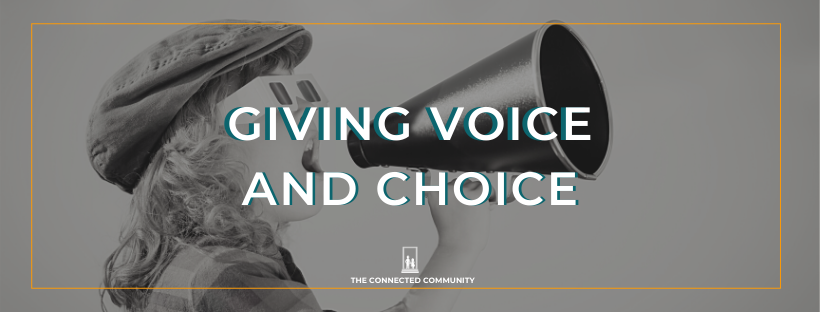Giving Voice and Choice

Children from ‘hard places’ such as those experiencing abusive and traumatic experiences have had little power to control what is happening in their lives. Powerlessness and hopelessness are unfortunately much more the norm than having their thoughts, feelings, and needs heard by a safe, trusted adult caregiver. One of the most powerful gifts we can give children who have not had the experience of voicing their needs and being heard is to give them choice. Offering a child the choice of “would you like to wear the blue shirt or the red?” or “would you like an apple or a banana” sounds so simple, but the more opportunities a child has to decide red shirt or blue, apple or banana, the more they begin to understand their ‘voice’ is a powerful tool - one that they will have all of their lives. The more we give the experience of using voice, or words to express needs, thoughts, and feelings, the more your child learns that their needs, thoughts, feelings matter. What a gift to give a child who may have begun to believe they were not worthy of having their ‘voice’ heard. What a simple expression of respect and honor that “yes little one, you are worthy - and I will hear you when you use your voice to let me know what you need.”
Learning to make decisions through these simple choice-making opportunities is helping to set the stage for a one-day grown person, who is able to make decisions independently and honor their own voice in the world knowing they have value and important ideas worthy of being heard. So often we hear "kids don’t know how to plan, organize, make good decisions.” The truth is, children need lots of practice to make choices so that they one day will be able to effectively be in the world planning, organizing their lives: deciding, choosing. If we can begin to offer these basic choices - starting when they are little and offering just two choices that you as a caregiver are comfortable with - over time the choices can become increasingly more varied and complex, which will all lay the foundation for the day when they are adults making thoughtful choices and using their ‘voice’ to feel their own power, their own value, their own hope for connecting to their world to become their optimal selves.
Activity:
Try using ‘voice and choice’ when your child is struggling with transitioning from point A to point B. If it’s bath time and your little one is not exactly cooperating with moving their body from the living room floor to the bathroom, try offering a playful choice such as “Would you like to hop like a bunny to the tub or make giant gorilla steps to get there?” Sounds silly maybe but give it a try! Our more typical “get up and go to the tub now because I said so” is more likely to get a child more stuck in their decision that they do not feel like a bath right now. A playful approach to a situation that could become a power struggle can often lead to an outcome of:
1) the child wants to ‘play’ (hop like a bunny or giant step like a gorilla) therefore forgets they were ready to engage in a conflict with you and
2) the grown-up accomplishes the task of getting a child to the tub without a long, drawn-out unpleasant and exhausting tantrum.
The greatest benefit of all is that you and your child are now more connected as you are playing rather than arguing - and deep connection is the goal! Along with a clean and contented child! ?
Written by Deb Levenseller, Clinical Director at The Maine Children's Home for The Connected Community @ MCH.